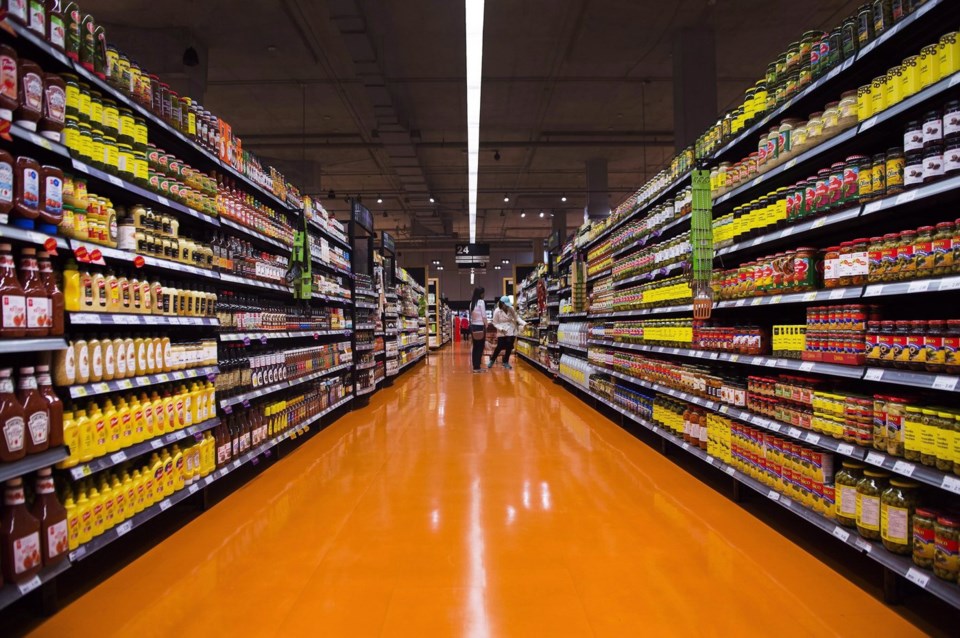As tariffs on Canadian goods and retaliatory levies filter through supply chains, industry insiders say some smaller Canadian food manufacturers may not be able to weather the storm much longer.
“I think you may see some companies just not making it,” said Michael Graydon, CEO of the Food, Health & Consumer Products of Canada association.
U.S. President Donald Trump has imposed tariffs on goods coming from Canada and Mexico, though he’s made any products compliant with the Canada-United States-Mexico trade agreement exempt from levies. Canada, in turn, brought in retaliatory tariffs on a wide swath of American goods.
Many business owners that rely on sales to the U.S. breathed a sigh of relief at that exemption, said Graydon.
“The challenge for these same companies, though, is a lot of the ingredients they’re using to manufacture their products are coming from the United States, and they’re now caught up in the retaliatory tariffs,” he said.
Some of these items aren’t readily available from elsewhere, he added.
The magnitude of the tariff effects depends on the business, such as what it imports or exports, said Matt Brown, senior director of client management with broker company Concord National, which works with packaged goods companies of all sizes.
For many, it’s not clear yet what exactly the impact will look like.
“There's still lots to figure out,” he said.
For Brad Woodgate’s three businesses — a supplement company, a sugar-free food and snack company, and a beverage company — Canada’s retaliatory tariffs have been far more damaging than U.S. levies on Canadian imports.
His products are largely exempt from U.S. tariffs, so retailers south of the border are still ordering as usual, but the products he imports from American manufacturers aren’t. And for the products he is able to manufacture in Canada, the majority of his inputs are still from the U.S. and have gone up in price as well.
“Everything. Packaging, protein, chocolate ... you name it, it’s been tariffed,” said Woodgate.
“It’s been chaos.”
Woodgate feels small- and medium-sized Canadian businesses are being unfairly penalized by Ottawa.
“What's going to happen is the biggest multinationals that can withstand these tariffs, like the Pepsis, the Cokes, the Gatorades, the Heinz, the Kraft, Unilevers, they're all going to absorb these losses longer than the small, mid-sized companies. The small, mid-sized companies will all go bankrupt,” he said.
To cope with higher costs, brands are preparing price increase requests for Canadian retailers, said Brown — with mixed results. Many of the retailers have shortened the time window they take to consider such requests, but others are digging in their heels and won’t accept price increases related to tariffs, he said.
“They're either asking the vendors to find creative ways to get around it, or they're asking the vendors to absorb it. That's where we're having one of our biggest issues right now,” Brown said.
Graydon said it’s harder for smaller companies to negotiate price increases with retailers.
“I think there is just such resistance to inflation at retail by the grocers and the fear factor of being blamed for it yet again,” he said.
Brands also have to weigh how much of a price hike consumers will accept, Brown added.
However, Graydon said the current focus on buying Canadian may also be an opportunity for some brands to seek out more retailers interested in selling their products.
“You may not get your price increase, but your volume will go up, which hopefully will create those efficiencies to help offset the incremental cost of goods that you have.”
For companies forced to absorb higher costs, that’s only a short-term solution, Brown said. The longer the situation goes on, the less viable their business becomes.
Smaller brands are often more innovative, with their products priced at a premium, said Henry Chambers, senior vice-president for Canada and the Americas at U.K.-based consulting firm Sentinel MC.
That makes raising prices harder, he said, and in the coming weeks and months, companies will have some tough decisions to make, including whether to discontinue a product or stop selling to certain retailers.
“You'll get some products that will just end up disappearing off the shelves,” he said.
And eventually, some companies will fold altogether.
“I think it would be ... within three to six months, because you just can’t survive,” said Chambers.
Some companies are trying to mitigate the costs of tariffs by shifting production, said Brown, giving the example of a coffee company that is moving its roasting from the U.S. to Canada to avoid the levies.
“Some are getting pretty creative ... Some it’s just not possible.”
Graydon said the higher costs and uncertainty also mean it’s harder for small firms to make big investment decisions that could improve their longer-term bottom line.
“Everybody’s kind of in that stall mode right now ... as they look to hopefully weather the storm.”
This report by The Canadian Press was first published April 11, 2025.
Rosa Saba, The Canadian Press



